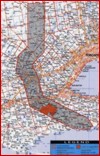
|
![]()
|
![]()  Outstanding lawful Outstanding lawful
![]() Obligations Obligations
![]() – Development of – Development of
![]() Six Nations Six Nations
![]() Land Rights Land Rights
|
![]()
|
|
![]()
|
![]()
|
![]()
|

|
![]()
|
|
Outstanding lawful Obligations – Development of Six Nations Land Rights
|
![]()
|
|
•
|
![]()
|
The Ontario Provincial government has recently introduced legislation which would impose severe time and technical limitations on First Nations land rights assertions (claims).
|
![]()
|
|
•
|
![]()
|
The criteria for determining validity of land rights assertions (claims) is based on a totally arbitrary, self serving and undefined policy of "lawful obligation" which dates back to Canada's 1969 White Paper Policy.
|
![]()
|
|
•
|
![]()
|
Lawful obligation has come to mean in practice that a First Nations land rights assertion (claim) is valid only if, in the opinion of a Department of Justice lawyer, the Crown would lose the case in court. This standard is simply meant to minimize government liability and is not based on standards of natural justice.
|
|
![]()
|
|
![]()
|
![]()
|
![]()
|

|
![]()
|
The Haldimand Treaty of 1784
Whereas His Majesty having been pleased to
direct that in consideration of the early attachment
to his cause manifested by the Mohawk Indians
and of the loss of their settlement which they
thereby sustained - that a ...  View More View More
|
![]()
|
|
![]()
|
![]()
|
![]()
|
|
|
|
![]()
|
![]()
|
![]()
|
|
Outstanding lawful Obligations (Six Nations' Claims Developed)
|
![]()
|
Some First Nations’ grievances occurred back a century or more, while some are more recent. Under the terms of the Indian Act, between 1927 and 1951, First Nations were not able to hire lawyers to bring claims against the Crown without the Government’s permission. Those provisions of the Indian Act were repealed and First Nations were then able to pursue their grievances against the Government. If an outstanding lawful obligation is found and damages are owed, Crown Canada offers to negotiate with First Nations.
As set out in the 1784 Haldimand Treaty, the Crown had a duty to protect Six Nations’ lands for their sole use. In many cases, not only did the Government fail to do so, the officials of the Crown actively encouraged settlement upon those lands. As a result of this intrusion, the lands became unsuitable as hunting grounds and Six Nations was forced to find alternate means of support.
The Department of Justice and/or Superior Court Judges decide on the validity of a First Nations claim and how much will be awarded. The awards have a limited amount and because of this “take it or leave it” scenario, the limit is not deemed appropriate or acceptable.
|
![]()
|
|
|

